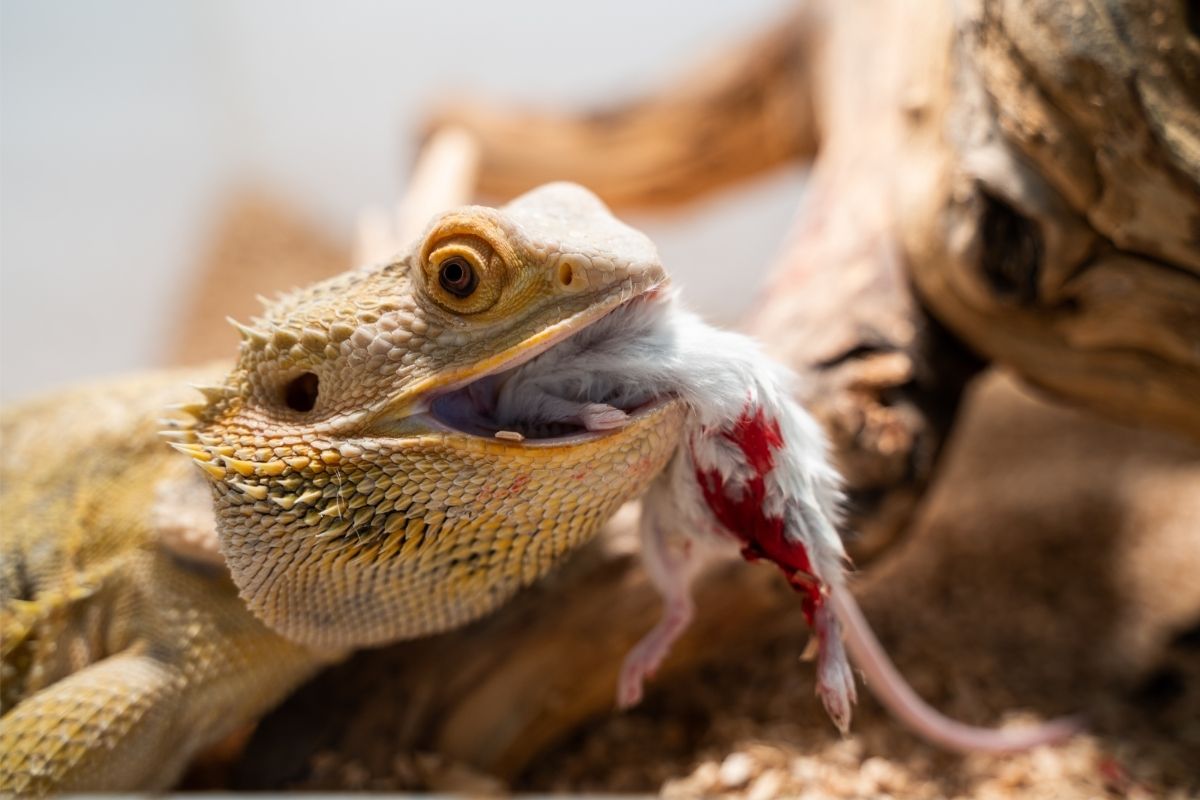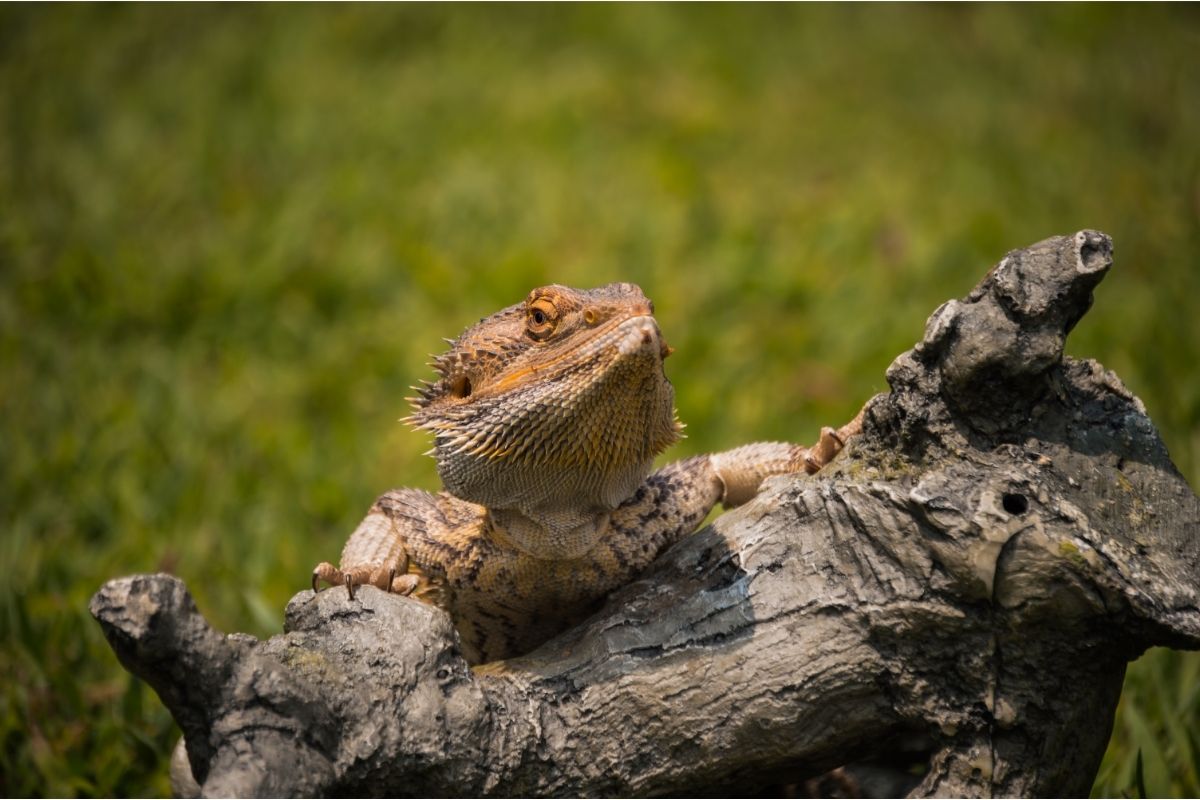As we all know, your pet’s diet is very important, and there are always questions in your mind, can they eat them? Should they be eating that?
When it comes to bearded dragons, they are known for eating anything that is alive and also without any type of hesitation.
The question today is whether bearded dragons can eat mice, what could stop them from eating them, could it be dangerous for them, and when is it ok to do so.

This niche conversation is definitely one that needs to be had because pet owners definitely get anxious about their pet’s health, and they want what’s best for them as their owners.
Therefore, finding out even the smallest of information is helpful when contributing to your pets health.
So, what is the big fuss about mice?
Let’s find out everything you need to know about this topic and educate yourself on something that could potentially help your pet.
Short And Sweet Answer
The short answer is that bearded dragons should not be fed mice regularly or be eating them frequently.
The reason for this is that it can potentially lead to worrying diseases such as fatty liver disease, which is definitely something you will want to avoid.
Even though they should eat mice after a bad disease or pregnancy due to needing an increase of nutrients, this is not something that should be on a regular basis.
There are so many other questions that will be asked that also need to be answered in full. For example, how to serve it. Do you serve it dead? You will be able to find out further down this piece.
Overall, your bearded dragon should only eat mice if they are recovering from a disease or are going through pregnancy!
Need To Know For Pregnancy
When bearded dragons are pregnant they need a lot! There are many things that are essential for their health at this time because they are in a more vulnerable state.
A huge must is having lots of nutrients to increase the energy of your pet as that will be running low at this particular time.
Whether your beardie is laying fertilized or unfertilized eggs, this process still requires a huge amount of energy and is something to consider monitoring to make sure your pet is getting enough and everything they need to get through the pregnancy.
Why Do They Need An Increase In Energy?
- They have to find the perfect spot to lay these eggs, somewhere safe and secure.
- Finding them diggin is very normal because they are creating the perfect space to lay their eggs because they would usually lay them in caves they have created themselves.
- Digging these areas can take a lot of that conserved energy which will need to be added to.
- Laying the eggs also takes a lot of energy after all of that digging!
- Calcium is a very important aspect of your bearded dragons diet at this time especially because they need it not only for themselves but also for the process of creating their eggs.
- It is normal for pet owners to feed their bearded dragon aged mice to help with the calcium intake, but more that later in more specifics.
Why Mice After Having A Disease?
The experience of having a bad disease can severely weaken your bearded dragon.
If they suffer from parasites, they have low healthy microorganisms and feeding them mice can actually start to build up their strength again and start getting back to normality.
Why Mice?
- They are very high in fat and protein that will help with building the strength back up.
- After having their energy drained by their disease or by parasites, they need to have a huge increase of energy, and that’s what mice can offer.
- If they did suffer from having parasites, your bearded dragon is more likely to be more inactive and will need the nutrients from the mice to start becoming more active again.
Why Can’t You Feed Them Mice Regularly?
When they are not pregnant or recovering from a disease they do not have a really low amount of energy in most cases.
If they are fed too many mice, it will be too much for their body, and if they are living in a tank, they have less room to burn off this energy.
Feeding your bearded dragon mice also has the negative impact of causing diseases.
As mentioned previously, there is a high content of protein in mic, and this can cause fatty liver disease because the amount is just too much for bearded dragons.
Like anyone, there needs to be a balance in a diet and for bearded dragons, this type of food is not ideal for a healthy diet.
- Not only are mice quite dangerous because your bearded dragon is fed at the wrong times, mealworms are also very high in protein and can have the same effect. Therefore, just be careful and watch your pet’s diet and try to keep it balanced for what food they can intake.

Is There A Type Of Way To Feed Them Mice?
There are several different parts of information you should know about what is the best type for your bearded dragon. Find it here below:
Mice Pinkies
YES, it is recommended that they can eat mice pinkies that are around a week old. When they are this age, pinkies are lower in fat and have better calcium which is the perfect balance for your bearded dragon.
However, depending on the age of the mice it can have a big impact and they offer either something higher or lower in protein, calcium and phosphor. The mice that are 7 days old have a higher phosphor level in comparison to calcium.
Therefore, mice that are 1 to 2 days old have lower phosphor levels in comparison to higher levels of calcium which is more appropriate for your bearded dragon’s diet.
PINKIES ARE THE BEST
Would Your Bearded Dragon Eat Mice In The Wild?
Bearded dragons can actually eat anything. Not that everything is particularly great for them but they can.
However, when bearded dragons are out in the wild in Australia, their food combinations are very different depending on what they can get. Their diet is most likely 80% greens and 20% live food.
When they are living with an owner it is very different because their diet can be controlled and balanced but in the wild they have to find their own food and it depends on what they can find.
Are The Mice Meant To Be Served Frozen Or Not?
They can eat them frozen, but before you actually feed them to your bearded dragon, you will have to defrost them and make sure their temperature is specifically 86F.
This is all down to your bearded dragon’s digestive system, it can be irritated easily if certain types of foods are served too cold or too hot.
Overall, it is very important to look into this sort of information about your pet if you have a bearded dragon because even small aspects of their diets like mice can really make a difference negatively and positively.
The one thing to remember is that it is positive to feed them mice when they are pregnant or recovering from disease to increase their energy levels.
However, it can be very damaging for your pet if you frequently feed them mice because it can cause fatty liver disease for them and unbalance their diet completely.
There’s more information about this topic and extra answered questions below.
Frequently Asked Questions
What Can I Feed my Bearded Dragon?
Collard greens, carrots, and other vegetables can be very beneficial to its diet.
However feeding whole pinky mice and not ones that have been cut into pieces can also be a very healthy addition to a bearded dragon’s diet as they do naturally eat whole prey in the wild.
How Old Should my Bearded Dragon be Before Feeding Mice?
A Bearded Dragon should begin feeding on whole prey such as pinky mice after 6 months or when it’s reached around 10 inches or more in length. Bearded Dragons are omnivores in the wild!
Conclusion
To conclude, mice can be very beneficial for bearded dragons in small doses. They are great for building strength and energy after an illness or during pregnancy, but they can be too fatty to become a staple of your bearded dragon’s diet.
It’s better to feed them in moderation so that they maintain a balanced diet.
